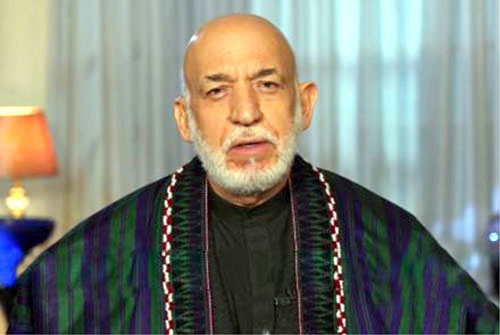Former President Hamid Karzai said that the people of Afghanistan want their girls to return to schools and there “is no way that the country can live without our girls going to school”.
Karzai made the remarks on the BBC’s Best of Today.
“There is no way… that the country can live without our girls going to school. It can’t be. The Afghan people will not allow that and I am sure the schools for girls will reopen because that is what the Afghan people want and want clearly,” Karzai said.
It has been 120 days that female students beyond grade six have been banned from going to school.
This comes as Human Rights Watch expressed concerns and said that the banning of girls from going to school will cause an increase in early marriages for girls.
“This has already had an irreparable effect on the lives of hundreds of thousands of girls across the country. They have lost a year of education which they will never be able to get back. We know that one of the most important risk factors for child marriage and forced marriage is girls being blocked from access to education,” said Heather Barr, associate director of the Women’s Rights Division at Human Rights Watch.
The Islamic Emirate’s decision to close schools for girls above grade six has faced repeated reactions inside the outside Afghanistan.
Earlier, many Afghan clerics, civil society members and some politicians have called on the Islamic Emirate to reopen schools for female students in grades 7-12.
“They are imposing a new law with each passing day, but there is a serious will to reopen the schools,” said Naveeda Khurasani, a women’s rights activist.
Earlier, UNICEF expressed concerns over the closing of secondary and high schools for female students.
Meanwhile, the United Nations International Children’s Emergency Fund (UNICEF) expressed its concerns over the closure of schools for female students beyond grade six, saying that over one million children are facing an uncertain future.
The organization asked international donors to continue their support to education for girls.
“We are in a primary school for girls (in) south of Kabul, and we are here to send a very clear message to the world to the donor community: Don’t give up on the education for girls in Afghanistan. These girls who are studying in primary schools are the hope of this country and they need our help now,” said Paloma Escudero, UNICEF Director for Global Communication and Advocacy.
“In one week alone, more than 50 girls and boys have lost their lives in a series of heinous grave rights violations in Afghanistan,” he said, adding that the figures are expected to rise.
He also said that Violence against children, in all its forms, must stop now.
Meanwhile, the Ministry of Education said that the schools for girls in grades 7-12 will be reopened in the near future.
“UNICEF promised to help the Ministry of Education in providing salaries for teachers. Also, the money will flow into accounts thay will prevent the existence of fake teachers,” said Aziz Ahmad Riyan, spokesman for the Ministry of Education.
Female students above grade six have been deprived of education since last week of March.
Meanwhile, teachers expressed frustration over the delay in their payments.
“Depriving girls from education and closing their schools have affected the government as well because it has been working on how to reopen the schools, but they are yet to find a solution. We ask the Islamic Emirate to reopen the schools for girls as soon as possible,” said Omarzada, a teacher.
“The Islamic Emirate promised to pay the salaries of all teachers every month, but we have not been paid our properly over the last few months,” said Samra, a teacher.—Tolonews










